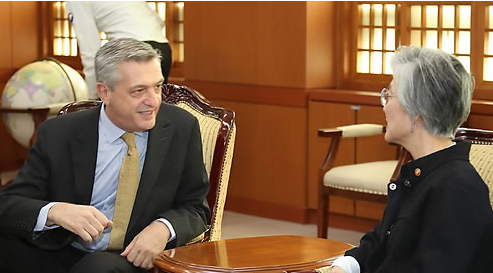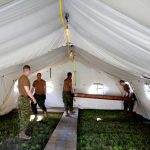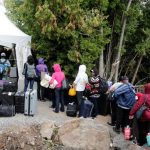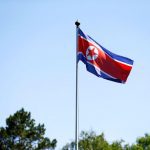U.N refugee chief has encouraged South Koreans to be more hospitable to asylum seekers.
According to U.N high commissioner for refugees, Filippo Grandi, he said;
The government’s handling of hundreds of Yemeni people marked a “positive” step, at least in the short and immediate term, although they were not granted the refugee status.
Wrapping up months of screening last week, the Ministry of Justice gave 339 Yemenis staying on Jeju Island renewable one-year humanitarian visas. The authorities are reviewing the qualifications of 85 others.
In an interview Grandi said;
“They are fleeing the worst humanitarian crisis in the world. So for me, there’s one immediate concern that they receive protection”
In that sense,a positive result is that they were not returned to Yemen, where they would be at risk.
Grandi said his agency respects the South Korean government’s decision, as determining the Yemenis’ legal status is a matter of the government’s discretion.
Grandi is well aware of the prejudices and negative views among some Koreans against the Yemenis and similar applicants for citizenship in the traditionally homogenous society.
“So, this process is gradual. We need to proceed gradually,” he emphasized.
“If you proceed too quickly, we risk reaction, I think, which is very dangerous, also politically dangerous. This is why I appreciate that the (South Korean) government is managing this issue with prudence.”
In his view, South Korea is already setting a meaningful precedent in Asia when it comes to the global refugee issue.
The government donated US$21.8 million to UNHCR in 2017 alone, while individuals and corporate partners contributed $35.8 million, according to official data. The donations are expected to grow this year.
It shows South Korea is becoming a more important partner of UNHCR in the region, a subject he discussed in a meeting with Foreign Minister Kang Kyung-wha on Tuesday.
“I think it should be also matched by hospitality,” Grandi said
U.N refugee chief has encouraged South Koreans to be more hospitable to asylum seekers.
According to U.N high commissioner for refugees, Filippo Grandi, he said;
The government’s handling of hundreds of Yemeni people marked a “positive” step, at least in the short and immediate term, although they were not granted the refugee status.
Wrapping up months of screening last week, the Ministry of Justice gave 339 Yemenis staying on Jeju Island renewable one-year humanitarian visas. The authorities are reviewing the qualifications of 85 others.
In an interview Grandi said;
“They are fleeing the worst humanitarian crisis in the world. So for me, there’s one immediate concern that they receive protection”
In that sense,a positive result is that they were not returned to Yemen, where they would be at risk.
Grandi said his agency respects the South Korean government’s decision, as determining the Yemenis’ legal status is a matter of the government’s discretion.
Grandi is well aware of the prejudices and negative views among some Koreans against the Yemenis and similar applicants for citizenship in the traditionally homogenous society.
“So, this process is gradual. We need to proceed gradually,” he emphasized.
“If you proceed too quickly, we risk reaction, I think, which is very dangerous, also politically dangerous. This is why I appreciate that the (South Korean) government is managing this issue with prudence.”
In his view, South Korea is already setting a meaningful precedent in Asia when it comes to the global refugee issue.
The government donated US$21.8 million to UNHCR in 2017 alone, while individuals and corporate partners contributed $35.8 million, according to official data. The donations are expected to grow this year.
It shows South Korea is becoming a more important partner of UNHCR in the region, a subject he discussed in a meeting with Foreign Minister Kang Kyung-wha on Tuesday.
“I think it should be also matched by hospitality,” Grandi said
U.N refugee chief has encouraged South Koreans to be more hospitable to asylum seekers.
According to U.N high commissioner for refugees, Filippo Grandi, he said;
The government’s handling of hundreds of Yemeni people marked a “positive” step, at least in the short and immediate term, although they were not granted the refugee status.
Wrapping up months of screening last week, the Ministry of Justice gave 339 Yemenis staying on Jeju Island renewable one-year humanitarian visas. The authorities are reviewing the qualifications of 85 others.
In an interview Grandi said;
“They are fleeing the worst humanitarian crisis in the world. So for me, there’s one immediate concern that they receive protection”
In that sense,a positive result is that they were not returned to Yemen, where they would be at risk.
Grandi said his agency respects the South Korean government’s decision, as determining the Yemenis’ legal status is a matter of the government’s discretion.
Grandi is well aware of the prejudices and negative views among some Koreans against the Yemenis and similar applicants for citizenship in the traditionally homogenous society.
“So, this process is gradual. We need to proceed gradually,” he emphasized.
“If you proceed too quickly, we risk reaction, I think, which is very dangerous, also politically dangerous. This is why I appreciate that the (South Korean) government is managing this issue with prudence.”
In his view, South Korea is already setting a meaningful precedent in Asia when it comes to the global refugee issue.
The government donated US$21.8 million to UNHCR in 2017 alone, while individuals and corporate partners contributed $35.8 million, according to official data. The donations are expected to grow this year.
It shows South Korea is becoming a more important partner of UNHCR in the region, a subject he discussed in a meeting with Foreign Minister Kang Kyung-wha on Tuesday.
“I think it should be also matched by hospitality,” Grandi said
U.N refugee chief has encouraged South Koreans to be more hospitable to asylum seekers.
According to U.N high commissioner for refugees, Filippo Grandi, he said;
The government’s handling of hundreds of Yemeni people marked a “positive” step, at least in the short and immediate term, although they were not granted the refugee status.
Wrapping up months of screening last week, the Ministry of Justice gave 339 Yemenis staying on Jeju Island renewable one-year humanitarian visas. The authorities are reviewing the qualifications of 85 others.
In an interview Grandi said;
“They are fleeing the worst humanitarian crisis in the world. So for me, there’s one immediate concern that they receive protection”
In that sense,a positive result is that they were not returned to Yemen, where they would be at risk.
Grandi said his agency respects the South Korean government’s decision, as determining the Yemenis’ legal status is a matter of the government’s discretion.
Grandi is well aware of the prejudices and negative views among some Koreans against the Yemenis and similar applicants for citizenship in the traditionally homogenous society.
“So, this process is gradual. We need to proceed gradually,” he emphasized.
“If you proceed too quickly, we risk reaction, I think, which is very dangerous, also politically dangerous. This is why I appreciate that the (South Korean) government is managing this issue with prudence.”
In his view, South Korea is already setting a meaningful precedent in Asia when it comes to the global refugee issue.
The government donated US$21.8 million to UNHCR in 2017 alone, while individuals and corporate partners contributed $35.8 million, according to official data. The donations are expected to grow this year.
It shows South Korea is becoming a more important partner of UNHCR in the region, a subject he discussed in a meeting with Foreign Minister Kang Kyung-wha on Tuesday.
“I think it should be also matched by hospitality,” Grandi said
U.N refugee chief has encouraged South Koreans to be more hospitable to asylum seekers.
According to U.N high commissioner for refugees, Filippo Grandi, he said;
The government’s handling of hundreds of Yemeni people marked a “positive” step, at least in the short and immediate term, although they were not granted the refugee status.
Wrapping up months of screening last week, the Ministry of Justice gave 339 Yemenis staying on Jeju Island renewable one-year humanitarian visas. The authorities are reviewing the qualifications of 85 others.
In an interview Grandi said;
“They are fleeing the worst humanitarian crisis in the world. So for me, there’s one immediate concern that they receive protection”
In that sense,a positive result is that they were not returned to Yemen, where they would be at risk.
Grandi said his agency respects the South Korean government’s decision, as determining the Yemenis’ legal status is a matter of the government’s discretion.
Grandi is well aware of the prejudices and negative views among some Koreans against the Yemenis and similar applicants for citizenship in the traditionally homogenous society.
“So, this process is gradual. We need to proceed gradually,” he emphasized.
“If you proceed too quickly, we risk reaction, I think, which is very dangerous, also politically dangerous. This is why I appreciate that the (South Korean) government is managing this issue with prudence.”
In his view, South Korea is already setting a meaningful precedent in Asia when it comes to the global refugee issue.
The government donated US$21.8 million to UNHCR in 2017 alone, while individuals and corporate partners contributed $35.8 million, according to official data. The donations are expected to grow this year.
It shows South Korea is becoming a more important partner of UNHCR in the region, a subject he discussed in a meeting with Foreign Minister Kang Kyung-wha on Tuesday.
“I think it should be also matched by hospitality,” Grandi said
U.N refugee chief has encouraged South Koreans to be more hospitable to asylum seekers.
According to U.N high commissioner for refugees, Filippo Grandi, he said;
The government’s handling of hundreds of Yemeni people marked a “positive” step, at least in the short and immediate term, although they were not granted the refugee status.
Wrapping up months of screening last week, the Ministry of Justice gave 339 Yemenis staying on Jeju Island renewable one-year humanitarian visas. The authorities are reviewing the qualifications of 85 others.
In an interview Grandi said;
“They are fleeing the worst humanitarian crisis in the world. So for me, there’s one immediate concern that they receive protection”
In that sense,a positive result is that they were not returned to Yemen, where they would be at risk.
Grandi said his agency respects the South Korean government’s decision, as determining the Yemenis’ legal status is a matter of the government’s discretion.
Grandi is well aware of the prejudices and negative views among some Koreans against the Yemenis and similar applicants for citizenship in the traditionally homogenous society.
“So, this process is gradual. We need to proceed gradually,” he emphasized.
“If you proceed too quickly, we risk reaction, I think, which is very dangerous, also politically dangerous. This is why I appreciate that the (South Korean) government is managing this issue with prudence.”
In his view, South Korea is already setting a meaningful precedent in Asia when it comes to the global refugee issue.
The government donated US$21.8 million to UNHCR in 2017 alone, while individuals and corporate partners contributed $35.8 million, according to official data. The donations are expected to grow this year.
It shows South Korea is becoming a more important partner of UNHCR in the region, a subject he discussed in a meeting with Foreign Minister Kang Kyung-wha on Tuesday.
“I think it should be also matched by hospitality,” Grandi said
U.N refugee chief has encouraged South Koreans to be more hospitable to asylum seekers.
According to U.N high commissioner for refugees, Filippo Grandi, he said;
The government’s handling of hundreds of Yemeni people marked a “positive” step, at least in the short and immediate term, although they were not granted the refugee status.
Wrapping up months of screening last week, the Ministry of Justice gave 339 Yemenis staying on Jeju Island renewable one-year humanitarian visas. The authorities are reviewing the qualifications of 85 others.
In an interview Grandi said;
“They are fleeing the worst humanitarian crisis in the world. So for me, there’s one immediate concern that they receive protection”
In that sense,a positive result is that they were not returned to Yemen, where they would be at risk.
Grandi said his agency respects the South Korean government’s decision, as determining the Yemenis’ legal status is a matter of the government’s discretion.
Grandi is well aware of the prejudices and negative views among some Koreans against the Yemenis and similar applicants for citizenship in the traditionally homogenous society.
“So, this process is gradual. We need to proceed gradually,” he emphasized.
“If you proceed too quickly, we risk reaction, I think, which is very dangerous, also politically dangerous. This is why I appreciate that the (South Korean) government is managing this issue with prudence.”
In his view, South Korea is already setting a meaningful precedent in Asia when it comes to the global refugee issue.
The government donated US$21.8 million to UNHCR in 2017 alone, while individuals and corporate partners contributed $35.8 million, according to official data. The donations are expected to grow this year.
It shows South Korea is becoming a more important partner of UNHCR in the region, a subject he discussed in a meeting with Foreign Minister Kang Kyung-wha on Tuesday.
“I think it should be also matched by hospitality,” Grandi said
U.N refugee chief has encouraged South Koreans to be more hospitable to asylum seekers.
According to U.N high commissioner for refugees, Filippo Grandi, he said;
The government’s handling of hundreds of Yemeni people marked a “positive” step, at least in the short and immediate term, although they were not granted the refugee status.
Wrapping up months of screening last week, the Ministry of Justice gave 339 Yemenis staying on Jeju Island renewable one-year humanitarian visas. The authorities are reviewing the qualifications of 85 others.
In an interview Grandi said;
“They are fleeing the worst humanitarian crisis in the world. So for me, there’s one immediate concern that they receive protection”
In that sense,a positive result is that they were not returned to Yemen, where they would be at risk.
Grandi said his agency respects the South Korean government’s decision, as determining the Yemenis’ legal status is a matter of the government’s discretion.
Grandi is well aware of the prejudices and negative views among some Koreans against the Yemenis and similar applicants for citizenship in the traditionally homogenous society.
“So, this process is gradual. We need to proceed gradually,” he emphasized.
“If you proceed too quickly, we risk reaction, I think, which is very dangerous, also politically dangerous. This is why I appreciate that the (South Korean) government is managing this issue with prudence.”
In his view, South Korea is already setting a meaningful precedent in Asia when it comes to the global refugee issue.
The government donated US$21.8 million to UNHCR in 2017 alone, while individuals and corporate partners contributed $35.8 million, according to official data. The donations are expected to grow this year.
It shows South Korea is becoming a more important partner of UNHCR in the region, a subject he discussed in a meeting with Foreign Minister Kang Kyung-wha on Tuesday.
“I think it should be also matched by hospitality,” Grandi said













